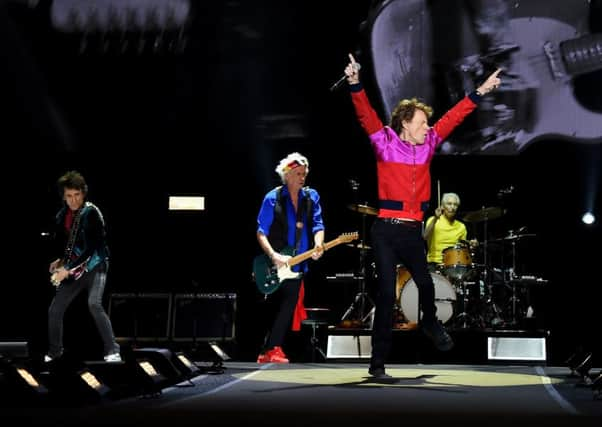Album reviews: The Rolling Stones | Peter Doherty | Jools Holland


The Rolling Stones: Blue & Lonesome ****
Polydor
Peter Doherty: Hamburg Demonstrations ****
BMG/Clouds Hill
Jools Holland: Piano ***
East West
Their rhythm’n’blues peer Eric Clapton popped in to lend a bit of Yardbirds frenzy and together the old stagers rather show the young(er) ones how it’s done. Their expert low-slung take on the Memphis Slim title track and the groovy junkyard squall of Howlin’ Wolf’s Commit A Crime have a raw spontaneity which echoes down from their hungry early years and is surely preferable to whatever crumbs they might have chosen to scrape from the songwriting table.
The entire collection bristles with a sense of carnivorous danger. Mick Jagger, in particular, is a man in his vocal element, messed up (according to the lyrics) but not to be messed with. There is almost a showmanship to the anguish he invests in the mean strut of All Of Your Love, a choppy urgency to his intentions on garage blues number I Gotta Go and chops-licking relish in the double entendres of Everybody Knows About My Good Thing with its saucy plumbing and milkman allusions.
Advertisement
Hide AdAdvertisement
Hide AdPeter Doherty, here using his business-like full name, is another instantly recognisable vocal stylist, but as laidback as Jagger is stimulated. His latest solo outing, Hamburg Demonstrations, was recorded in the eponymous city where he lived for six months, though it is English whimsy which informs his patchwork of literary, cultural and historical references on opener Kolly Kibber and Flags from the Old Regime, a hangdog tribute to his friend Amy Winehouse.
The conventional indie pop rocker Birdcage is enlivened by a great gutsy vocal pairing with his business partner Suzi Martin, while Hell to Pay At the Gates of Heaven wrongfoots the listener with a breezy music hall-styled response to the terror attacks in Paris, a city close to Doherty’s libertine heart. He was one of the first artists to play at the re-opened Bataclan and confronts its recent bloody history by challenging “come on boys choose your weapon – J-45 or AK-47” in reference to the Gibson J-45 guitar.
You could be forgiven for presuming a Jools Holland album called Piano would feature wall-to-wall boogie-woogie ivory tinkling but this is the fleet-fingered bandleader/broadcaster as you may not have heard him before, jumping freely between styles and traditions, some lo-fidelity, some surprisingly smooth, from the elevator muzak of Eruption to the unvarnished boogie-woogie of Upright and Grand. He enlists his trusty Rhythm & Blues Orchestra on a couple of numbers but this is largely a solo undertaking in celebration of his favoured instrument. Grand Hotel cleverly dovetails stride piano with Italian piano house in a celebration of dance music down the decades while he unexpectedly channels the spirit of easy listening maestro Richard Clayderman on a number of smooth jazz instrumentals.
CLASSICAL
A Verlaine Songbook *****
BIS
The rich musical suggestiveness of French symbolist Paul Verlaine’s poetry was a constant inspiration for composers, particularly among his fellow Frenchmen, Debussy, Ravel, Fauré, Saint-Saëns and Chausson. All are represented in this alluring Verlaine Songbook featuring soprano Carolyn Sampson and pianist Joseph Middleton. Sampson opens with the sinewy, illusory delights of Debussy’s Fêtes Gallants, evoking a succulent mix of ripeness and quiet ecstasy. Ravel’s Sur L’Herbe has a opulent sensuousness of its own, which Sampson counters with the simpler shapely curves of Fauré’s La Bonne Chanson, the rapt stillness of Chausson’s Apaisement, the fleeting energy of Saint-Saëns’ Le Vent Dans La Plaine, and the symmetrical perfection of two of Reynaldo Hahn’s Chansosn Grises. There’s an unexpected delight from the pen of one Poldowski, daughter of Polish violinist Wieniawski, whose five songs are genuine head-turners.
Ken Walton
FOLK
McCalmans: Lost Tracks ****
Greentrax
Those bereft at this pre-eminent Scots vocal trio’s disbanding in 2010 can rejoice that Ian McCalman has trawled through more than 40 years of archives to come up with 19 hitherto unreleased tracks. Rather than being ropey relics, many find the Macs in splendid form.
There’s an inevitably elegiac element in that Derek Moffat and Nick Keir are no longer with us, the album opening with Keir’s regretful Cold Night in This Old Town, while Moffat leads a sturdy version of The Diamond. The Peatbog Soldiers finds the original trio in stirring form in 1980, while old chestnuts include Wild Mountain Thyme, with Stephen Quigg leading, and cheerful ditties such as Wheel of Fortune, recorded for a TV series.
A fine a cappella version of Lowlands Away is quintessential McCalmans, while a real collector’s piece is Barbara Dickson singing Plooman Laddies with them, recorded in Sandy Bell’s in the late Sixties. ■
Jim Gilchrist